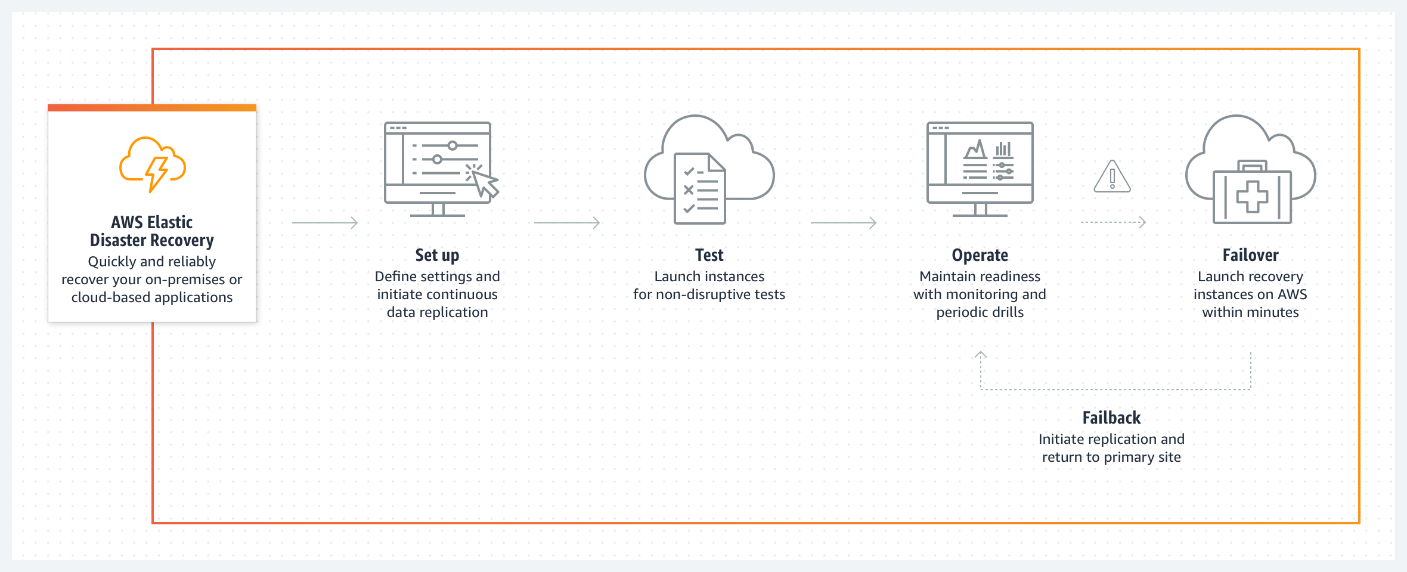AWS Elastic Disaster Recovery
Seamless Business Continuity with AWS Elastic Disaster Recovery
In today’s fast-paced digital landscape, unexpected disruptions can severely impact business operations, leading to downtime, loss of data, and missed opportunities. AWS Elastic Disaster Recovery offers a robust, reliable solution designed to help organizations achieve seamless business continuity and resilience against disasters. With its ability to replicate critical workloads across AWS infrastructure, Elastic Disaster Recovery minimizes downtime, enabling rapid recovery and enhanced operational efficiency.

Why Choose AWS Elastic Disaster Recovery?
AWS Elastic Disaster Recovery allows businesses to:
Minimize Downtime
Quickly recover critical applications to ensure business operations resume with minimal interruption.
Reduce Costs
Pay only for the resources you use with AWS’s flexible, cost-effective disaster recovery solution.
Simplify Management
Easily manage disaster recovery processes through the AWS Management Console with automation and real-time monitoring.
Increase Reliability
Leverage the power of AWS’s globally distributed data centers to ensure data integrity and application availability.
How Wiscloud Ensures Your Business Continuity with AWS
As an AWS Advanced Partner, Wiscloud specializes in building resilient, scalable solutions for disaster recovery and business continuity. Our team of experts works closely with your organization to
Assess Requirements
We conduct an in-depth analysis to understand your business continuity needs and identify critical workloads.
Design Tailored Solutions
Wiscloud customizes disaster recovery plans using AWS Elastic Disaster Recovery that align with your recovery time objectives (RTO) and recovery point objectives (RPO).
Implement with Precision
Our team ensures a smooth setup and configuration of AWS Elastic Disaster Recovery, integrating seamlessly with your existing environment.
Provide Ongoing Support
We offer 24/7 monitoring, testing, and support to keep your disaster recovery systems fully functional, ensuring you’re always prepared.
Benefits
Save costs
Save costs by removing idle recovery site resources, and pay for your full disaster recovery site only when needed.
Recover in minutes
Recover your applications within minutes, at their most up-to-date state or from a previous point in time.
Unified process
Use a unified process to test, recover, and fail back a wide range of applications, without specialized skillsets.
Automate actions
Automate actions such as configuring your environment, cleaning up drill resources or activating monitoring tools on launched instances.
Use Cases
On-premises to AWS
Quickly recover operations after unexpected events such as software issues or datacenter hardware failures. AWS DRS enables RPOs of seconds and RTOs of minutes.
Cloud to AWS
Help increase resilience and meet compliance requirements using AWS as your recovery site. AWS DRS converts your cloud-based applications to run natively on AWS.
AWS Region to AWS Region
Increase application resilience and help meet availability goals for your AWS-based applications, using AWS DRS to recover applications in a different AWS Region.
How it works
AWS Elastic Disaster Recovery (AWS DRS) minimizes downtime and data loss with fast, reliable recovery of on-premises and cloud-based applications using affordable storage, minimal compute, and point-in-time recovery.

Set up AWS Elastic Disaster Recovery on your source servers to initiate secure data replication. Your data is replicated to a staging area subnet in your AWS account, in the AWS Region you select. The staging area design reduces costs by using affordable storage and minimal compute resources to maintain ongoing replication. You can perform non-disruptive tests to confirm that implementation is complete. During normal operation, maintain readiness by monitoring replication and periodically performing non-disruptive recovery and failback drills. If you need to recover applications, you can launch recovery instances on AWS within minutes, using the most up-to-date server state or a previous point in time. After your applications are running on AWS, you can choose to keep them there, or you can initiate data replication back to your primary site when the issue is resolved. You can fail back to your primary site whenever you’re ready.